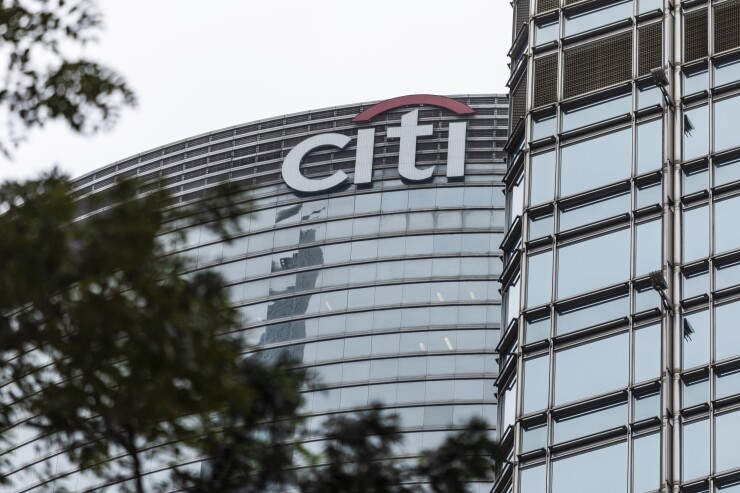Citigroup saw wealth management and overall revenues drop slightly during what bank leaders described as an “unpredictable” first quarter in earnings statements released late last week.
But the bank remains positive about the momentum of the global wealth management business
“Wealth revenues declined 1%, driven by less client activity and investments, partially offset by higher deposits. Investment revenues declined as geopolitical tensions impacted the capital markets, which resulted in clients pulling back their trading activity, particularly in Asia,” Citigroup Chief Financial Officer Mark Mason said during the firm’s earnings call with analysts, according to a transcript by Motley Fool. “However, underlying drivers remain strong with average deposits up 14%, average loans up 5%, client assets up 4% and client advisors up 6%.”
Citigroup Global Wealth Management
But it was an improvement for the quarter with global wealth management revenues up 7% compared to the close of 2021. Meanwhile, the 4% increase in client assets pushed the total to $788 billion in Q1 2022 compared to $756 billion in Q1 2021.
Total revenue came in at $19.2 billion for the quarter, down 2% for the year but up 13% from Q4 2021. Contributing to the year-over-year slide was lower non-interest revenue across businesses that offset higher net interest income driven in part by services in Citi’s Personal Banking and Wealth Management division.
Net income of $4.3 billion was down 46% from a year ago, driven by the higher cost of credit, higher expenses and the declining revenues. Expenses rose to $13.2 billion, an increase of 15% year over year.
Net interest income was $10.9 million for the quarter, an increase of 3% from the year-ago period. Earnings per share were $2.02, 59 cents better than the average estimate of analysts polled by FactSet Research Systems.
Citi’s personal banking business contributed $4 billion in the first quarter, bringing the
Retail Services revenues of $1.3 billion were largely unchanged as higher net interest income was offset by higher partner payments, driven by improved credit performance, officials said.
“While the geopolitical and macro environment has become more volatile, we are executing the strategy we announced at our recent investor day,” CEO Jane Fraser said in a statement. “We had good engagement in key drivers such as cards, loan growth and vigorous purchase sales growth, so we like where this business is headed. While geopolitics dampened performance in wealth management, we are hiring bankers, enhancing our client offerings and continuing to add clients in both the private bank and in Citigold.”
Citigroup’s private bank caters to the ultrawealthy, serving more than 10,000 ultrahigh net worth clients hailing from over 100 countries including more than a quarter of the world’s billionaires. The firm’s Citigold offerings cater to investors with as much as $10 million in assets.
Looking ahead, Fraser said the Russian invasion of Ukraine and the sanctions it triggered unleashed an enormous supply shock on the world, fueling inflation and placing global growth under considerable pressure.
She said the macro outlook for the rest of the year can only be described as “complex and uncertain.” And while it is her job to prepare for all outcomes, Citi’s view is that strong nominal income growth and continuing momentum in the labor market will help support overall growth in the U.S. in the face of inflationary pressures.
“So, with all that is going on in the world, we remain laser-focused on the execution of our strategy and our transformation,” Fraser said during last week’s earnings call. “I expect the macroenvironment to remain unpredictable, to say the least, in the backdrop of a war which is equally tragic and unnecessary, and the persistent pandemic.”







